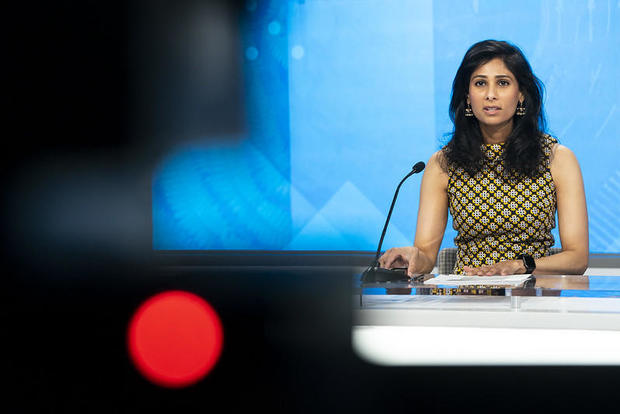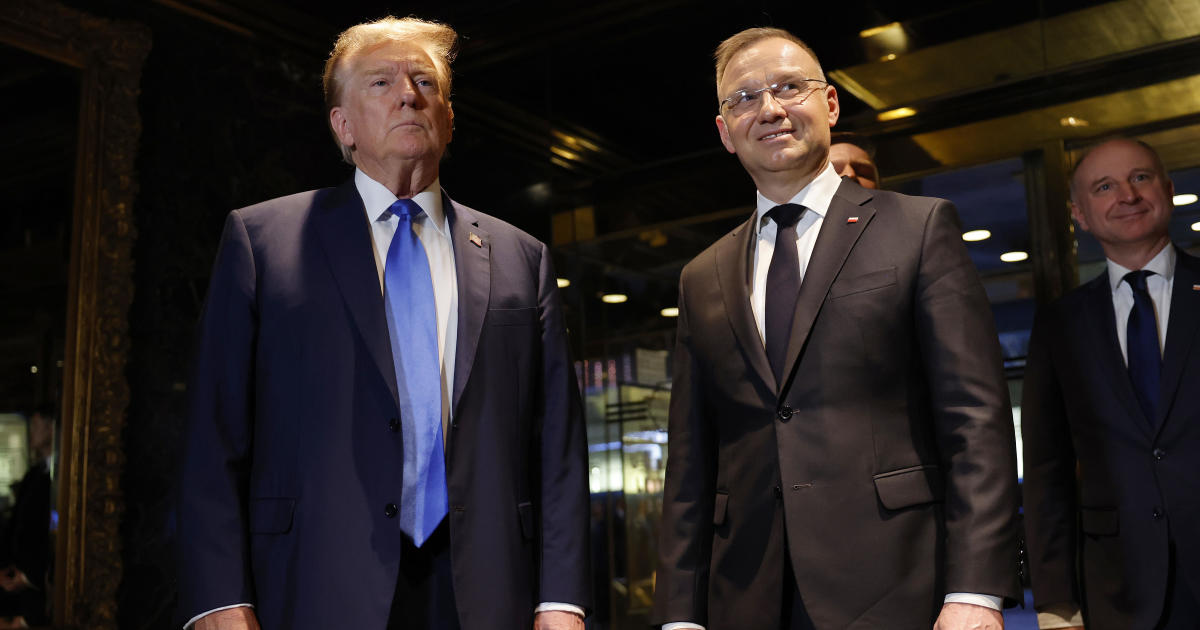IMF's Chief Economist Gita Gopinath on the global financial recovery in the wake of COVID-19
In this episode of Facing Forward, Margaret Brennan talks to the International Monetary Fund's Chief Economist Gita Gopinath as the global economy is set to expand at the fastest pace in decades. But while vaccines and trillions in pandemic-related government spending gave a much needed jolt to the worldwide economy, IMF's latest findings warn of an unequal recovery around the world.
Highlights
- On preventing an all-out global financial crisis during COVID: "What did go right was that policy support really stepped up and the mistakes that were made after the global financial crisis were not repeated again. There was about 16 trillion dollars that were deployed and put in the system, way more than anything that was done after the global financial crisis. And I think that was one very important measure that helped put a floor on the collapse, including what central banks did, of course, in preventing a global financial crisis this time around."
- On forecasts for a full recovery for the US labor market: "Based on our projections, that should happen next year in terms of bringing back the unemployment rate to where it was pre-pandemic and also bringing back some of the workers who left the labor force because they just kind of lost hope, so to bring back the labor force participation rate. So I think next year would be the year when we would see a fairly full recovery in the US labor market."
- On what's at stake with an uneven global recovery: "We're not predicting instability at this point, but if, you know, we don't rectify this great divergence and if people, you know, if countries actually fall back tremendously in terms of increased poverty, then that would lead to social unrest. And that is a major issue. It can lead to geopolitical concerns. And so that is something that the world needs to worry about, which is why we said now is the time for the international community to do everything it can to prevent this great divergence."
Download, rate and subscribe here: Apple Podcasts, Spotify and Stitcher
"Facing Forward": International Monetary Fund's Chief Economist Gita Gopinath
Producers: Richard Escobedo, Anne Hsu, Kelsey Micklas
MARGARET BRENNAN: Gita Gopinath, welcome to the podcast.
GITA GOPINATH: Thank you so much for inviting me to join you.
MARGARET BRENNAN: So we were reading in and one of the things that stood out was this Vogue magazine profile of you calling you a feminist icon. What is it like to be the first chief economist at the IMF who happens to be a woman?
GOPINATH: Well, I mean, it's a- a- a tremendous honor to have this position, though I don't think they had to wait this long to get a woman to be a chief economist. There were many wonderful economists, women economists that preceded me could have done- done this job just as well. So I'm actually- I'm actually very grateful to Christine Lagarde, who is a former managing director who hired me there and said, you know, it's about time that we end this male dominance in chief economist roles.
MARGARET BRENNAN: So how do you explain or how did you explain what the IMF does to your mother when you got the job?
GOPINATH: I think it's going to be impossible. But what- what, but you know, there is something I can point to her as- as being an example, because in 1991 when India had a- a financial crisis at that time the IMF had come into India and provided financing. And that was actually the start of some very important reforms in India. So she has heard of the IMF in that sense. And so, you know, I could jog a memory and she was like, oh yes, now I remember.
MARGARET BRENNAN: So, I mean, for listeners just to set the table, so the institution you help run as chief economist was created basically to help keep the global economy stable and to avoid the kind of disasters that we saw contribute to World War II. So- so times of crisis is really what the IMF was created to help avoid or- or get us out of. So like a year ago, we're all standing on the brink of the abyss with this great lockdown, as you called it. And now, a year later, you are looking at the world and saying we're going to grow, that the economy is actually looking like it's headed in a positive direction. What went right?
GOPINATH: Lots of things were really tough about last year in terms of the pandemic and the lives that were lost. But what did go right was that policy support really stepped up and the mistakes that were made after the global financial crisis were not repeated again. There was about 16 trillion dollars that were deployed and put in the system, way more than anything that was done after the global financial crisis. And I think that was one very important measure that helped put a floor on the collapse, including what central banks did, of course, in terms- preventing a global financial crisis this time around. So I think these measures were really important to bring the world back from the brink of even greater collapse. And, you know, we avoided a Great Depression.
MARGARET BRENNAN: So when you look at what happened after COVID-19 in that recession, you said it's likely to leave smaller scars than the 2008 global financial crisis. So when I think back to the crisis, the thing that I think sticks with a lot of Americans is how long it took to recover the jobs. It took a decade in America to regain that ground. How long do you think it will take America this time to get back to even?
GOPINATH: Right now, based on our projections, that should happen next year in terms of bringing back the unemployment rate to where it was pre-pandemic and also bringing back some of the workers who left the labor force because they just kind of lost hope, so to bring back the labor force participation rate. So I think next year would be the year when we would see a fairly full recovery in the US labor market.
MARGARET BRENNAN: So this is before we factor in the trillions more in spending that the Biden administration is now proposing Americans help pump into the US economy. Do you think what you're seeing with this growth is real, that it's not just a sugar high?
GOPINATH: You know, given the large number of people who are unemployed, you know, and still looking for work, there is a lot of what we call slack in the- in the economy, many people who have lost their livelihoods. And they need to be brought back. They need to regain their jobs. Women have been hard hit. We need to bring back women into the workforce. So the spending that's been done to bring back a strong recovery, fast recovery is- is real. I mean, it is what we will see in terms of improved employment numbers, improved livelihoods, improved income. So, I- I mean, this is- this was needed.
MARGARET BRENNAN: Growth, though, you're saying around the world isn't going to be even. It's not going to be clear sailing for everyone. You've called it the great divergence. What are the consequences of that- of this being kind of an uneven global recovery?
GOPINATH: What this is doing, if you look at our projections for different parts of the world, you know, while advanced economies, and the US included, are expected to do just fine, we have emerging markets in low-income countries that are getting hit very hard in terms of per capita income losses. And this is really troubling because it's reversing the progress that was made over the last couple of decades in terms of reduction in poverty. We are- expect to see 95 million or more into extreme poverty because of this crisis. And, you know, clearly these are losses that we cannot afford to suffer. And similarly, as you're going to see, lack of convergence in prospects for countries around the world. Before this crisis, we had many emerging and developing economies that were converging to rich country income levels, and that has been set back severely by this crisis.
MARGARET BRENNAN: What parts of the world are you worried about?
GOPINATH: If you look at the Latin American region as a whole and you look at the hit to their output or their income in 2024 relative to where they would have been in the absence of the pandemic, we're talking about losses of around six to 7% of GDP. Similarly, in emerging Asia, excluding China, that hit is around 8%. Sub-Saharan Africa, the losses are around six to 7%. So, you know, in many parts of the world, we are seeing these kinds of long- long term scarring effects, which is really troubling because most of these countries already are starting out at lower per capita income levels than, of course, the rich would.
MARGARET BRENNAN: And in real world terms, that means it's tougher to put food on the table. That means it's really impacting people's ability to survive. What kind of political implications are- are you seeing here? Are you predicting instability?
GOPINATH: We're not predicting instability at this point, but if we don't rectify this great divergence and if people, you know, if countries actually fall back tremendously in terms of increased poverty, then that would lead to social unrest. And that is a major issue. It can lead to geopolitical concerns. And so that is something that the world needs to worry about, which is why we said now is the time for the international community to do everything it can to prevent this great divergence.
MARGARET BRENNAN: Social unrest, I mean, that can mean a lot of different things. Here in America, after the financial crisis, there was like this massive distrust of institutions. You know, had the Tea Party movement. You had Occupy Wall Street on, you know, both sides of the political divide. In Europe you had nationalist groups that kind of came to the fore. Do you think we know yet what the impact of this recession driven by the pandemic will be? Do we have a sense yet?
GOPINATH: You know, we have a sense. Yes, we do. We have, you know, our projections for the amount of scarring that will happen. And this time around, it's- in advanced economies, it's- it's projected to be quite small relative to, again, after the global financial crisis. But that said, you know, we still have the pandemic. It isn't over yet. And if there is a new virus, a mutation that makes the vaccines ineffective, then that I think is a huge downside risk. And so if we have an even longer, prolonged pandemic, I think we're looking at much more severe problems. And, you know, that's why the number one priority has to be everywhere in the world to get vaccinations done.
MARGARET BRENNAN: So it's the virus and the vaccine that determine everything right now?
GOPINATH: Absolutely. I think it has been the case for the last, you know, year and over that.
MARGARET BRENNAN: So we had the co-head of COVAX, you know, with part of this global initiative to get vaccines into countries around the world. He was with us on FACE THE NATION and he said they've placed billions of, you know, orders for billions of doses, They've got billions of dollars in financial support, but they can't actually get their hands on vaccine:
*TAKE SOT*
SETH BERKLEY: The majority of those are coming in the second half of the year and in the first half of the year there- because of vaccine nationalism, has meant that there are less doses available. So that's our biggest challenge. Now, if we had more doses, we could make those available.
*END SOT*
MARGARET BRENNAN: How significant a delay is something like that to how you see the world?
GOPINATH: I think this is extremely costly. You know, we crunched some numbers and we said if you could get vaccinations to go much faster, then that would add nine trillion dollars to the global economy between now and 2024. And about 40% of that nine trillion would be a benefit to advanced economies that would come from just bringing back all parts of the world from the abyss. And so it is- it is a big loss. Every month of delay is a big loss to the global economy and, of course, to individual lives. And, you know, this is, again, in terms of the- the absolute top agenda items, both at the national and international level, just getting vaccinations, much more widespread vaccinations, is just absolutely at the top.
MARGARET BRENNAN: Gita, stay with us. We're going to take a quick break.
*COMMERCIAL*
*TAKE SOT*
TREASURY SECRETARY JANET YELLEN: We are working with G20 nations to agree to a global minimum corporate tax rate that can stop the race to the bottom. Together, we can use a global minimum tax to make sure that the global economy thrives based on a more leveled playing field in the taxation of multinational corporations, and spurs innovation, growth and prosperity.
*END SOT*
MARGARET BRENNAN: So the treasury secretary, Janet Yellen, said this week that one way the Biden administration plans to pay for at least part of this proposed trillions of new spending packages that they're going to put forward by proposing a global minimum corporate tax rate. To the average person at home that doesn't really sound like anything concrete. Gita, do you have any idea how this would work?
GOPINATH: So the IMF actually has for a while been arguing for the need to have a global minimum corporate tax rate. What that basically means is where all nations in the world agree that the corporate rate at which they tax the corporations are, you know, there will be some minimum level above which their rates will be. So there's- it's not as if there's a race to the bottom and everybody is now trying to bring down tax rates to the lowest possible level, because what that means is you end up with companies basically, you know, shifting their locations artificially to benefit from lower tax rates. And so to avoid this kind of race to the bottom, having a floor in terms of having a- a common minimum level of corporate taxation would be very valuable.
MARGARET BRENNAN: So this is to stop companies from essentially shopping around for a cheaper deal in another country.
GOPINATH: That's right. Exactly. And so then, and, you know, going and look, you know, in some sense, doing the financial engineering that's needed so that they end up paying very low taxes in some part of the world, quite disconnected from where it is that they actually make a lot of their revenues.
MARGARET BRENNAN: So isn't there a downside, though, in some ways? I mean, like Ireland, for example, has this 12.5% corporate tax rate. The US is talking about raising the global minimum to 21%. If you raise it, doesn't that hurt countries, smaller countries like Ireland, that- that basically rely on having these companies come to them because they charge this lower rate?
GOPINATH: Well, there is indeed this very challenging issue of what exactly should be the corporate tax minimum rate. And indeed, 21% is- would be high relative to what we're seeing around the world now. Now we don't have a prescription in terms of what that number should be, but to get to cooperation and actually to get countries to agree on any kind of a minimum, obviously, you know, they will have to negotiate with each other to agree on what that level should be. But, yes, this is not an easy, you know, agreement to make happen at all for the reasons that you just mentioned.
MARGARET BRENNAN: Right. So the Biden administration's proposal here is based on a premise of something that's actually already really complicated to get to. You know, this is not a done deal by any stretch of the imagination yet.
GOPINATH: No, it's- not. It's certainly not, no.
MARGARET BRENNAN: So the US is the largest financial contributor to the IMF. And- and for Americans who are, you know, are frustrated with what's happening in their own backyard right now and they see supporting institutions like the IMF as kind of subsidizing the rest of the world, how do you explain to them why what the IMF is doing is necessary?
GOPINATH: Well, I would just say that it's absolute- absolutely crucial for the health of the U.S. economy, for the people in the U.S. in terms of their jobs and their livelihoods, what is happening in the rest of the world. The U.S. trades with many countries. It receives investments from different parts of the world. And so having a healthy global economy, having everybody else outside the U.S., you know, being in a healthy setup is very, very important for the economic prosperity of the U.S. and also to avoid geopolitical crises, tensions around the world. Again, from a security perspective, too, I think it's very important to have a world that is prosperous and is stable, which is what exactly the IMF strives to accomplish.
MARGARET BRENNAN: Do you think that this crisis will change how governments around the world respond to economic problems like this? I mean, it- it kind of blows my mind when you think of how much money we are talking about right now, we've kind of normalized the word "trillion." There have been trillions of dollars spent to dig us out of this hole. Like what- do we have a sense yet of how things have changed?
GOPINATH: Indeed, I think there is a- a big sea change in the, you know, the desire, the capacity, the- the- the demands on governments to step up and in this crisis, they did many things that were right and were absolutely essential for dealing with this crisis. I mean, the way I think about it is there is a lot of unfinished business that the governments had even preceding this crisis, which is to make sure that all people in their country have access to basic public services like universal health care, you know, high quality education. And I think and, you know, a good social safety net. And we know that countries that had all of this have been able to deal with this pandemic much better than those that did not. And so, again, I would hope that coming out of this crisis, countries will finish this business of- of providing basic public services at the level and quality that's needed, making sure that you have a way of supporting poorer households, that they get the right kinds of opportunities, that you actually bring down inequality, which has gone up quite substantially. So, you know, this is the direction in which the world is moving towards building a more greener, more inclusive, you know, economies.
MARGARET BRENNAN: So it's not just getting back to even, it's totally remaking the system in some ways?
GOPINATH: I think it has accelerated what needed to be done. And, you know, inequality preceded this crisis. Climate change preceded this crisis. But I think everybody now realizes that these cannot be left unaddressed. And- and I see this as quite a fundamental change after this crisis.
MARGARET BRENNAN: We have Janet Yellen, the first female treasury secretary who before that was the first female head of the Federal Reserve, Christine Lagarde, the head of the European Central Bank, head of the IMF, also female. And we're in a crisis that has impacted women in a way we just have not seen before in history. What do you make of that kind of unique timing? Do you feel like there's a reason that all of this is kind of coming together at once? Do you feel like you need to use your position to fix this particular part of the problem?
GOPINATH: Oh, absolutely. I think one of the big pluses of having women- women in senior positions is that they scream out when there are issues that affect women specifically. I think that's been a problem in the past. So I think there's a very strong common message coming out of multiple institutions saying that women are being harder hit in this crisis. You will need to provide targeted support. When you have the recovery going on, it's not enough to say that, okay, the unemployment rate has come down. You have to make sure that women are coming back into the labor force, that they haven't left the labor force on a permanent basis, that they are absolutely essential for the recovery, for the global economy. And so I think, you know, these- these are the messages we will continue to put out there. And my hope is that, you know, concrete actions will be taken.
MARGARET BRENNAN: The World Economic Forum said it was like a generation of progress that had been lost. Do- are- do you have that dire prediction for women?
GOPINATH: I don't think so. I mean, I- I- I am, of course, deeply concerned by the lost, you know, jobs of women and the fact that because they still continue to be the main- main caregivers whenever schools have shut down, they are the ones who have been most hard hit. But again, what we are seeing in terms of the recovery is that as contact-intensive service sectors are reopening, you know, your restaurants are reopening, people are traveling again. These are sectors that hire a lot of women, and you can see that women employment rates are coming back up. So I- I remain optimistic that we can fix this. And just like we are trying in every other dimension not to leave big scars from this crisis, I think, again, this- in the matter of women, that is one area in which we are also working very hard.
MARGARET BRENNAN: Gita Gopinath, thank you so much for your time.
GOPINATH: Thank you, MARGARET.




